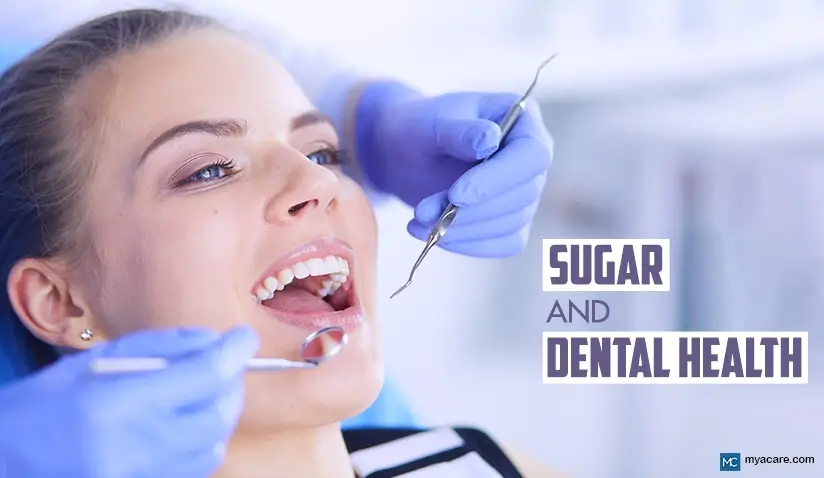Impact of Sugars on Dental Health

Regular consumption of sugar-rich diets or sugar-sweetened beverages increases the intake of calories but does not provide the required nutrition. This results in an unhealthy diet, weight gain, and risk of developing cardiovascular diseases, diabetes, and dental issues.
With the increased consumption of sugars, dental caries (tooth decay or dental cavity) has become a major public health issue globally. In the Global Burden of Disease Study 2015, the prevalence of dental caries ranked first for permanent teeth (affecting 2.3 billion people globally) and twelfth for milk teeth (affecting 560 million children globally). Tooth decay leads to pain and discomfort and if ignored, may cause infection, swelling, and difficulty while chewing. It may require extensive treatment or removal of the tooth, impacting the quality of life of an individual. High costs involved in treating dental cavities also contribute to the financial burden.
In this article, we discuss different types of sugars, their role in causing dental cavities, and ways to reduce sugar consumption.
What are different types of sugars?
Sugars are mainly of two types: Natural sugars and free sugars.
Natural sugars are inherently present in the structure of several products such as grains, fruits, vegetables, milk, and milk-based products.
Free sugars or added sugars are added by manufacturers, cooks, or buyers while processing food and beverages. Sugars naturally present in honey, syrups, smoothies, fruit juices, and their concentrates are also considered as free sugars.
How do sugars cause dental cavities?
Natural sugars present in grains, vegetables, fruits, and milk do not significantly contribute to dental cavities. However, consumption of added or free sugars contributes to dental cavities. Research suggests that certain species of bacteria (especially Streptococcus mutans and Streptococcus sobrinus) have a specialized metabolic mechanism that easily ferment free sugars to produce acid. The acid produced lowers the pH of the oral cavity and slowly dissolves the enamel (outer layer of the tooth), creating cavities. If ignored, the cavity turns deeper and spreads into the inner layers of the tooth.
How much sugar consumption increases the risk of dental cavities?
Research suggests that consuming more than 60 grams of sugar per day increases the risk of dental cavities in adults and adolescents. In preschool or young children, more than 30 grams of free sugar consumption per day has a similar consequence. There are 65 countries in the world where an average individual consumes more than 100 grams of sugars per day.
What is the recommended daily intake of sugar to limit decay?
According to the World Health Organization (WHO), the recommended daily intake of sugars should be 5-10% of total energy intake in both adults and children. (See note below)
What are the common sources of free or added sugars?
Below are some of the common sources of free or added sugars:
- Sugary beverages such as soda or energy drinks
- Sugars in tea or coffee
- Fruit juice syrups and concentrates
- Sweets
- Ice cream
- Candies or chocolates
- Prepackaged snacks (e.g., biscuits, cakes, chips, flavored yogurts, breakfast cereal)
Should all sugary foods and beverages be avoided to reduce the risk of decay?
Consumption of free sugars in the diet or beverages (e.g., chocolates, prepackaged snacks, soda, and energy drinks) should be reduced, and intake of natural sugars present in grains, vegetables, and fruits should be increased. These foods are rich in fiber and promote the flow of saliva. This helps in washing away bacteria and food debris from the surfaces of teeth. Also, instead of soda or energy drinks, individuals should drink plenty of water which encourages saliva production.
What are the ways to reduce the risk of tooth decay due to a high sugar diet?
Introducing policies to promote lower consumption of free sugars could address the incidence of dental caries globally. These policies may include:
- Levying high taxes on beverages and foods with high free sugars content, discouraging their sales
- Applying nutritional labeling on edible foods with detailed information on sugar intake, allowing buyers to make an informed choice
- Regulating advertisements and marketing of foods and beverages high on free sugars
- Regulating the sales of sugar-rich products in schools, universities, and other public workplaces
- Introducing healthier alternatives to sugar-rich foods and beverages
Below are some of the measures that individuals can choose at a personal level:
- Cut down free sugar consumption to 5-10% of the total energy intake
- Read the list of ingredients carefully before buying food products to check for the quantity of free sugars present
- Increase the intake of high-fiber-rich vegetables and fruits which promote the flow of saliva
- Increase the intake of dairy products as they are rich in calcium and phosphates which strengthen teeth
- Brush twice a day using a fluoridated toothpaste
- Rinse mouth properly after every meal
- Avoid intake of sticky foods that stick to teeth for a long time, increasing the risk of decay
- Chew sugar-free gum for 20 minutes after eating, for better production of saliva and better cleansing action
- Avoid sharing food and beverages to avoid the spread of bacteria
- Visit a dentist for regular checkups
Note: Recommended daily consumption of sugar
Recommended daily calorie intake in women=2000 calories
10% of total energy intake= 200 calories
1 gram of sugar= 4 calories
So, recommended sugar consumption is 200 calories=50 grams of sugars per day
To search for the best dentists in Germany, India, Malaysia, Poland, Singapore, Spain, Thailand, Turkey, the UAE, the UK and the USA, please use the Mya Care search engine.
To search for the best healthcare providers worldwide, please use the Mya Care search engine.

Dr. Shilpy Bhandari is an experienced dental surgeon, with specialization in periodontics and implantology. She received her graduate and postgraduate education from Rajiv Gandhi University of Health Sciences in India. Besides her private practice, she enjoys writing on medical topics. She is also interested in evidence-based academic writing and has published several articles in international journals.
References:
Featured Blogs



